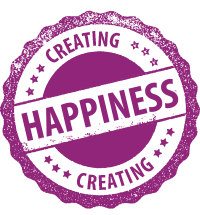My experience is that in order to thrive and build a life I love, I need to be in touch on a daily basis with my mission statement (aka my inner compass). That is, I need to slow down and be clear on how I want to live this day, how I want to treat myself and others, what my goals and priorities are.
Only when I am aware of who I want to be, can I then choose to align my thoughts, words, and behaviors with those values. That is, when you come in your life to a choice point, to a fork in the road, where you have different options regarding what to do, say or think, you need to be aware of your inner compass, otherwise, you will most likely fall into default behavior.
Default behavior is choosing to do what you have done most frequently in the past, or choosing the path of least resistance. When you choose default behavior, you are reactive instead of being proactive. The goal is to become a proactive agent shaping your life with passion and determination.
Once you know what your mission statement looks like, making choices consistent with it will be the next step. For example, if part of your mission statement is to live a life with integrity, when you then get a lucrative job offer from a company whose business practices are shady, it will be clear to you that you need to decline.
Or, if part of your mission statement is to no longer sweat the small stuff, when then a driver cuts you off on the highway you will choose to let it go.
I go over my mission statement in the morning when I am on the train to work. I have it on my phone and it only takes me about ten minutes. They are one of the most important minutes of my day, and when I skip it, I quickly notice myself slipping into default mode. Being in touch with my inner GPS allows me to be focused, intentional, and content when I see my choices being congruent with my values.
Not without reason do all of the big wisdom traditions, be they Christianity, Islam, Judaism, Buddhism, or Hinduism, have daily rituals. We humans seem to have figured out over time that if we want to stay on target, we have to remind ourselves on a daily basis what kind of life we want to live.
Ready to put together your own mission statement? Great! Here are some guidelines:
1. Take off any pressure.
Remember that there is no right or wrong way of doing this. What matters is to start. You can adjust your mission statement at any point later on. I frequently change my mission statement while I go over it, depending on the current challenges and goals I have.
2. What are your values?
When determining your values, it is helpful to distinguish between values and goals. Values are the direction you choose for your life, the kind of person you want to be. Whereas goals are specific and can be achieved. First, get in touch with your values, as knowing your values is a prerequisite for being able to determine your goals. Once you know them, defining your goals will flow smoothly later on.
Next, become quiet and spend some uninterrupted time with yourself. Grab a notebook, phone or laptop, and take some time to reflect on who you want to be in the different areas of your life.
Who do you want to be in your romantic relationship, at work, with your family, in your friendships, when it comes to taking care of your health, community engagement, personal development, your spirituality? If I missed an area that is important to you, simply add it to this list.
For example, when I took a look at my values and who I want to be in my romantic relationship, some of the things that came up for me were that I want to be a partner who gives and asks for respect, truth, kindness, and loyalty. I want to be in a relationship where both of us see our needs as equally valid. I want to seek and provide respectful and constructive dialogue.
Or, when I took a look at the values I have for my work, some of the things that came up for me were that I want to be hardworking and give my best, I want to be supportive and respectful, I want to make sure I have honest and meaningful work, get fair financial compensation, and have work that allows me to grow professionally.
3. What questions will you ask yourself at the end of your life that will tell you that you have lived a good life.
Another helpful exercise to determine your values is to think of your last moments in this world, the very end of your life. If you are conscious, what questions will you ask yourself that will tell you if you have lived a good life. Those questions will strongly reflect your values.
I think for me, some of those questions will be, “Have I loved those I love as hard as I could? Do I have regrets? Have I done my best to leave this world a better place? Did I follow my passion and ignore fear?”
There is something so clarifying about death. In an instant, it can bring you in touch with what really matters to you. I used to volunteer at a palliative care unit, and each time I left the hospital building it was crystal clear to me what mattered in my life and what did not.
Two excellent books that can help you figure out your values are The Top Five Regrets Of The Dying by Bronnie Ware and The Five Secrets You Must Discover Before You Die by John Izzo.
4. Prioritize your values.
Once you are clear about your values, your next step is to prioritize them. You won’t be able to fit all of your values into your mission statement at once. Choose the most pressing areas first, these are the parts of your life you are itching to see aligned with your new-found values.
One simple way to figure out which areas in your life you want to focus on first, is to rate them with numbers between one (not important at all) and ten (crucial). I suggest you choose no more than two areas when you put together your mission statement the first time. It is more effective for most of us to make small, steady changes that last, as big changes have the tendency to not stick.
5. Add your goals.
The final step is to add specific goals to your mission statement. Stick with one or two daily goals, more might overwhelm you. I want you to be set up for success.
For example, if your values in your personal development area are to learn Italian. Add as a goal to practice that language 15 minutes a day. Or, if your values in your health area are to be fit, add the goal of going on a daily 20- minute walk.
One of my clients allowed me to share her mission statement with you. Hope it will inspire you! Here it is:
“I’m awesome. Good things are heading my way and I will let them in. My true nature is to be positive, free, creative and adventurous. I choose to live my life to the fullest and no longer be ruled by fear. I will be ruled by passion and love and move toward what tickles and excites me.
I am brave, capable and I’ve got this. I will miss nothing and waste nothing. I have the power, resilience and strength to keep going. I am at peace and centered when I believe I can do anything and anything is possible if I try.
I’m committed to my own personal growth and fiercely attacking all the limiting beliefs that keep me from living my best life now. Trying is winning and I’ve already won. In God I live and move and have my being.”
In order to implement positive change and to live a purposeful and focused life, you need to check in regularly with yourself regarding who you want to be and what you want to accomplish. Creating your mission statement is one fun and effective way to do so. My wish for you is that it may allow you to soar to new heights.
References:
The Top Five Regrets Of The Dying by Bronnie Ware (2012).
The Five Secrets You Must Discover Before You Die by John Izzo (2008).

This post is part of the blog series "Creating Happiness", your inspiration to promote positive change in your life.
Do you like Daniela's posts? Subscribe to her blog series:
ABOUT THE AUTHOR
Ms Daniela Beer-Becker, Psychologist
Daniela is a regular contributor to the Blake Psychology blog and author of the "Creating Happiness" series.
MORE POSTS IN THE SERIES
















